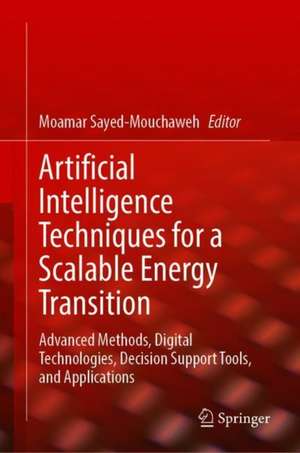Artificial Intelligence Techniques for a Scalable Energy Transition: Advanced Methods, Digital Technologies, Decision Support Tools, and Applications
Editat de Moamar Sayed-Mouchawehen Limba Engleză Hardback – 20 iun 2020
| Toate formatele și edițiile | Preț | Express |
|---|---|---|
| Paperback (1) | 731.28 lei 6-8 săpt. | |
| Springer International Publishing – 21 iun 2021 | 731.28 lei 6-8 săpt. | |
| Hardback (1) | 737.43 lei 6-8 săpt. | |
| Springer International Publishing – 20 iun 2020 | 737.43 lei 6-8 săpt. |
Preț: 737.43 lei
Preț vechi: 899.30 lei
-18% Nou
Puncte Express: 1106
Preț estimativ în valută:
141.15€ • 153.37$ • 118.64£
141.15€ • 153.37$ • 118.64£
Carte tipărită la comandă
Livrare economică 21 aprilie-05 mai
Preluare comenzi: 021 569.72.76
Specificații
ISBN-13: 9783030427252
ISBN-10: 3030427250
Pagini: 382
Ilustrații: IX, 382 p. 146 illus., 120 illus. in color.
Dimensiuni: 155 x 235 mm
Greutate: 0.73 kg
Ediția:1st ed. 2020
Editura: Springer International Publishing
Colecția Springer
Locul publicării:Cham, Switzerland
ISBN-10: 3030427250
Pagini: 382
Ilustrații: IX, 382 p. 146 illus., 120 illus. in color.
Dimensiuni: 155 x 235 mm
Greutate: 0.73 kg
Ediția:1st ed. 2020
Editura: Springer International Publishing
Colecția Springer
Locul publicării:Cham, Switzerland
Cuprins
Introduction.- Definition, motivation and impact of digitalization in energy transition.- Definition of a general scheme (layers) of a digitalized system in energy transition.- Challenges of digitalization in energy transition.- Artificial Intelligence for energy transition.- General principals and classification of Artificial Intelligence techniques for energy transition.- Artificial Intelligence for Smart Energy Management.- Smart energy management (intrusive and non-intrusive load monitoring).- Artificial Intelligence for Cyber Security and Privacy.- Artificial Intelligence for Mobility and Electrical Vehicles.- Mobility and electrical vehicles.- Artificial Intelligence for Micro Grid Operations and Dynamic Pricing Revenue Management.- Micro Grid operations and Dynamic Pricing Revenue Management.- Artificial Intelligence for Renewable Energy Penetration and Demand Side Management.- Renewable Energy Penetration and Demand Side Management.- Emerging Trends, Open problems, and Future Challenges.- Conclusion.
Notă biografică
Moamar Sayed-Mouchaweh received his Master degree from the University of Technology of Compiegne-France in 1999. Then, he received his PhD degree from the University of Reims-France in December 2002. He was working as Associated Professor in Computer Science, Control and Signal processing at the University of Reims-France in the Research center in Sciences and Technology of the Information and the Communication (CReSTIC). In December 2008, he obtained the Habilitation to Direct Researches (HDR) in Computer science, Control and Signal processing. Since September 2011, he is working as a Full Professor in the High National Engineering School of Mines “Ecole Nationale Supérieure des Mines de Douai” at the Department of Computer Science and Automatic Control (Informatique & Automatique). He edited the Springer book ‘Learning in Non-Stationary Environments: Methods and Applications ‘, in April 2012 and wrote two Brief Springer books in Electrical and Computer Engineering: ‘Discrete Event Systems: Diagnosis and Diagnosability’, and ‘Learning from Data Streams in Dynamic Environments’. He was a guest editor of several special issues of international journals. He was IPC Chair of the 12th IEEE International Conference on Machine Learning and Applications (ICMLA'13), the Conference Chair and IPC Chair of IEEE International Conference on Evolving and Adaptive Intelligent Systems (EAIS2015), and the IPC Chair of the 15th IEEE International Conference on Machine Learning and Applications (ICMLA'16). He is working as a member of the Editorial Board of Elsevier Journal “Applied Soft Computing” and Springer Journals “Evolving systems” and “Intelligent Industrial Systems”.
Textul de pe ultima copertă
This book presents research in artificial techniques using intelligence for energy transition, outlining several applications including production systems, energy production, energy distribution, energy management, renewable energy production, cyber security, industry 4.0 and internet of things etc. The book goes beyond standard application by placing a specific focus on the use of AI techniques to address the challenges related to the different applications and topics of energy transition. The contributions are classified according to the market and actor interactions (service providers, manufacturers, customers, integrators, utilities etc.), to the SG architecture model (physical layer, infrastructure layer, and business layer), to the digital twin of SG (business model, operational model, fault/transient model, and asset model), and to the application domain (demand side management, load monitoring, micro grids, energy consulting (residents, utilities), energy saving, dynamic pricing revenue management and smart meters, etc.).
- Uses examples and applications to facilitate the understanding of AI techniques for scalable energy transitions
- Includes examples, problems, and techniques in order to increase transparency and understanding of the methodological concepts
- Dedicated to researchers, practitioners, and operators working with industrial systems
Caracteristici
Uses examples and applications to facilitate the understanding of AI techniques for scalable energy transitions Includes examples, problems, and techniques in order to increase transparency and understanding of the methodological concepts Dedicated to researchers, practitioners, and operators working with industrial systems
